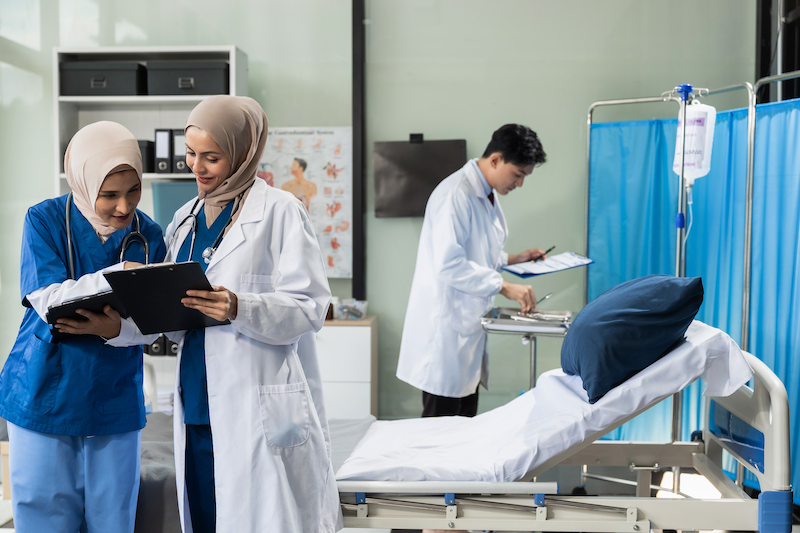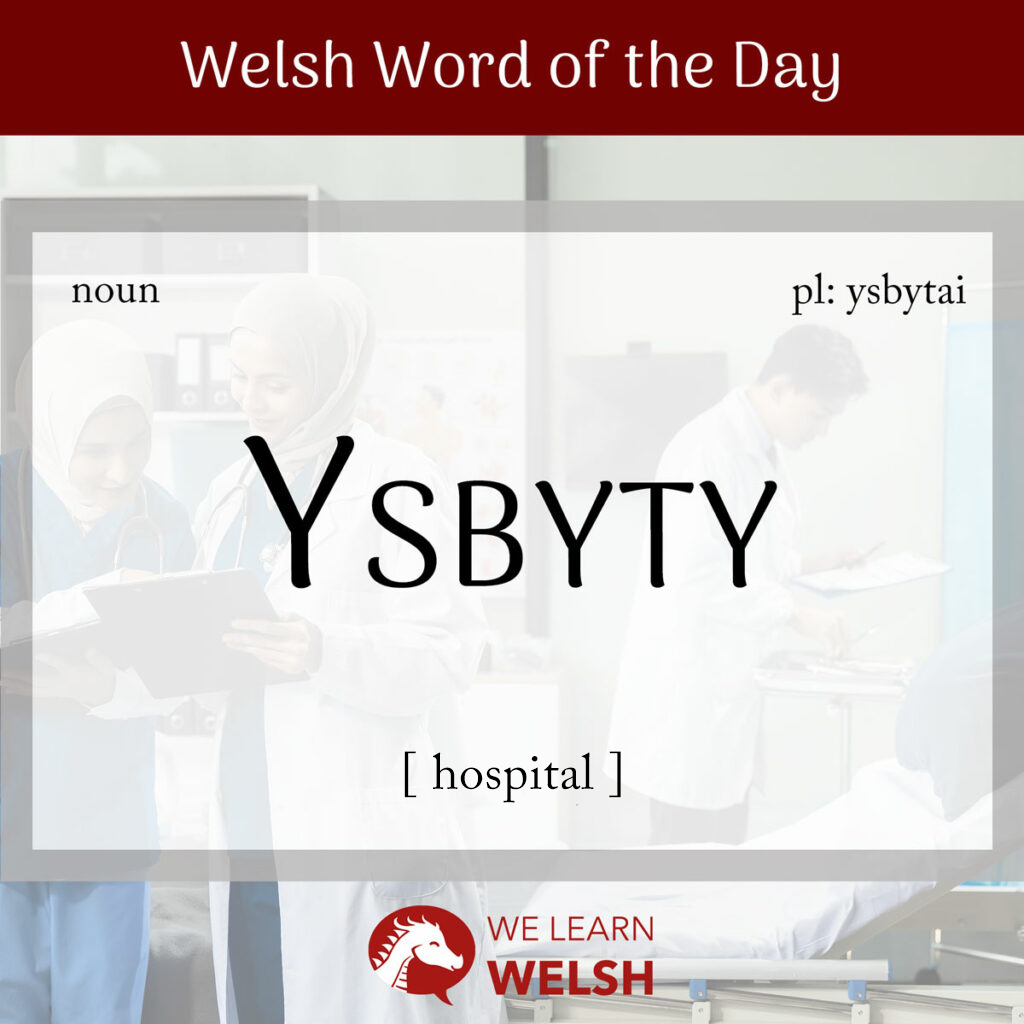Living in the UK, I know I’m very lwcus (lucky) to have access to free healthcare through y Gwasanaeth Iechyd Gwladol (the National Health Service). But did you know that the NHS was actually founded by a Cymro (Welshman)?
Aneurin Bevan was health minister of the UK’s post-World War Two llywodraeth (government). He spearheaded the decision to found a nationally organised service for healthcare, taking over charity ysbytai (hospitals) across the UK, expanding services provided, and assigning every single citizen to a meddyg teulu (GP). So next time you visit the ysbyty (hospital), you’ll know who to thank!
ysbyty
hospital
Ysbyty is one of many Welsh words based on the word tŷ, meaning house. All manner of adeiladau (buildings) in Welsh are described as tai (houses), from bwytai (restaurants), to gweithdai (workshops), to even tai bach (toilets).
Since tŷ is a masculine word, ysbyty is too. This is also why ysbyty pluralises to ysbytai, rather than the spelling we normally see for plurals, which would be ysbytau. In fact, you might sometimes see ysbytau used, but it’s very rare and non-standard.
The first part of the word, yspyd, was likely a word in its own right in early Welsh. It was borrowed into proto-Brittonic as something along the lines of *osbid from the Latin *hospitium, which I’m sure looks very familiar!
Ysbyty is the word for hospital all over Wales. It might sometimes get shortened to ‘sbyty colloquially, but this tends to happen to all words beginning with y.
Historically, it would have also been used to describe some other kinds of establishments besides just hospitals. This includes various kinds of guesthouses, now known as lletai (lodgings) or gwestai (hotels), but this usage is obsolete. On the other hand, it might still sometimes be used to mean hospice, although hosbis has become the most common term.
Aside from ysbytai and hosbisau, there are a lot of different kinds of ysbyty. Some of these include:
- ysbyty cyffredinol = general hospital
- ysbyty cymunedol = community hospital
- ysbyty mamolaeth / ysbyty geni = maternity hospital
- ysbyty seiciatreg / ysbyty meddwl = psychiatric hospital
- ysbyty cardiaidd = cardiac hospital
- ysbyty deintyddol = dental hospital
- ysbyty hyfforddi / ysbyty athrofaol = training hospital
Mynd i’r ysbyty (going to hospital) can of course be a really difficult and upsetting experience. While many people self-admit, in an emergency situation an ambiwlans (ambulance) will be sent to take a claf (patient) to the ysbyty. As well as being stocked with important equipment, ambiwlansys (ambulances) are driven by trained parameddygon (paramedics) who can deliver emergency care.
Mae hi yn yr ambiwlans, ar y ffordd i’r ysbyty.
She’s in the ambulance, on the way to hospital.
Once y claf (the patient) is yn yr ysbyty (in hospital), the meddygon (doctors) and nyrsys (nurses) do their best to make sure cleifion (patients) receive the best care possible.
Depending on the salwch (illness) or niwed (injury), there are a variety of different kinds of triniaeth (treatment) that might be appropriate. Often, meddyginiaeth (medicine) is prescribed, or the claf might be told to make lifestyle changes.
In very serious cases, llawfeddygaeth / llawdriniaeth (surgery) may be necessary. These words come from placing llaw (hand) at the beginning of meddygaeth (the practice of medicine) and triniaeth respectively. As you can see in both cases the second word has taken a soft mutation – this pretty much always happens in Welsh compound words.
Different treatments take place on different wardiau, such as the:
- ward achosion brys = accident and emergency
- ward oncoleg = oncology ward
- ward resbiradol = respiratory ward
- ward gardioleg / ward gardiaidd = cardiac ward
- ward haematoleg = haematology ward
- ward endocrinoleg = endocrine / diabetes ward
- uned gofal arbennig = intensive care unit
- uned gofal arbennig i fabanod = neo-natal intensive care unit
- uned trawma = trauma
- llawfeddygaeth cyffredinol = general surgery
We’ve talked about meddygon, parameddygon, llawfeddygon (surgeons),and nyrsys. But there are many more professions which contribute to the treatment of cleifion and the smooth running of ysbytai.
Bydwragedd (midwives), anesthetyddion (anaesthetists), deietegwyr (dieticians), technolegwyr meddygol (medical technicians), ffisiotherapyddion (physiotherapists), radiolegwyr (radiologists), cynorthwywyr meddygon (physicians’ assistants), ymchwilwyr (researchers), and fferyllyddion (pharmacists) all work in ysbytai. Honestly, I didn’t even know half of these jobs existed until I married a myfyriwr meddygaeth (medical student) myself!
And of course, we can’t forget non-medical staff such as glanhawyr (cleaners), arlwywyr (caterers), gofalwyr (carers), and derbynyddion (receptionists).
Mae fy nghefnder yn gweithio mewn ysbyty yn Llundain.
My (male) cousin works in a hospital in London.
There’s no doubt that the recent pandemig (pandemic) has made us all much more appreciative of ysbytai and the people who are gweithio (working) in them. I know this was the case for me, especially as my family live in rural mid-Powys, where it takes around an hour to drive to the nearest fully-equipped ysbyty, and far longer to be served by an ambiwlans.
This is not just a problem in Powys. Many settlements in Wales are incredibly sparsely populated, and often poorly equipped with essential services. Only three have more than 50,000 inhabitants (Cardiff, Swansea, and Newport), and all three of these dinasoedd (cities) are in South Wales.
I say this not to complain – there’s a lot to be said for living in the middle of nowhere, enjoying clean air, wildlife, and beautiful scenery. But, when studying the nation that gave us Aneurin Bevan, we should spare a thought for those who don’t have access to the resources he pioneered.


